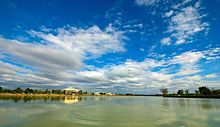Ubon Ratchathani University
This article needs additional citations for verification. (January 2021) |
มหาวิทยาลัยอุบลราชธานี (ม.อบ.) | |
 | |
| Type | Public university |
|---|---|
| Established | July 29, 1990 |
| President | Assistant Professor Chutinun Prasitpuriprecha, PhD |
| Location | , 15°7′4.95″N 104°54′4.95″E / 15.1180417°N 104.9013750°ECoordinates: 15°7′4.95″N 104°54′4.95″E / 15.1180417°N 104.9013750°E |
| Campus | Urban, 8 square kilometres (2,000 acres) |
| Colours | Blue and yellow |
| Website | www |
 | |

Ubon Ratchathani University (UBU) (Thai, มหาวิทยาลัยอุบลราชธานี) was established as a campus of Khon Kaen University, Thailand, in 1987. It gained independent university status in 1990.
History[]
Ubon Ratchathani University (UBU) was founded in 1987 as a regional campus of Khon Kaen University. It was established as a university by the Royal Charter in 1990. It aims to provide educational opportunities for the people of North-East Thailand, servicing specifically the provinces of Amnat Charoen, Mukdahan, Nakhon Phanom, Sakon Nakhon, Si Sa Ket, Ubon Ratchathani, and Yasothon. However, UBU also welcomes, encourages and has students from outside cities, such as Bangkok, Chiang Mai, Songkhla, etc. to learn more about the Isan culture, while also recruiting and hosting international students from countries such as Laos, Cambodia, Vietnam, Cameroon, South Sudan and more! The university supports and encourages research that benefits the local, national, and international communities, and promotes activities that preserve the cultural identity of the area.
The university is located on Sathonlamark Road (Warin-Detudom Road), 15 kilometres south of Ubon Ratchathani city. It is easily accessible by public transportation from the airport, the numerous bus terminals in Ubon Ratchathani, and the train station in Warin. The campus is spacious and is situated in a rural setting, occupying approximately 5,300 rai (848 hectares). UBU is situated in an up and coming small city setting, occupying approximately 2,100 acres (848 hectares). Its student population totals around 15,000 students.
The University’s logo is in the form of a Lan Chang period chedi, a religious structure common in Isan. The chedi contains a lotus blossom resting upon a three-tiered pedestal representing the main rivers of the province, the Mekhong, the Chii and the Moon. The two bottom petals of the blossom represent the qualities of morality and intellectuality that the University strives to develop in its students. The three top petals represent the “Triple Gem” of Buddhism, a recognised pathway to happiness. The pink of the lotus is the official colour of the province, and the blue outline of the logo represents the strength and stability of the University. The yellow background is the official colour of the University. The symbolic tree of the University is the Kan-Krao, a fragrant yellow flowering tree that grows prolifically on campus. Kan-Krao can grow even in infertile soil. Its timber is very hard and can withstand termites, so it is excellent in the construction of houses and furniture. The tree represents the strength and unity of the university working towards the future.
You can learn more about the university on its official website: www.english.ubu.ac.th [1]

Semester times[]
UBU mainly operates on a two-semester program. For Academic Year 2020, semester 1 is from 22 June 2020 to 30 October 2020 and Semester 2 is from 9 November 2020 to 20 March 2021. There are few courses in the summer semester which is from 5 April 2021 to 22 May 2021.[2]
Academic[]
Faculties and College[]
Health Sciences
Sciences and Technology
Humanities and Social Sciences
- Faculty of Applied Arts and Architecture
- Faculty of Law
- Faculty of Liberal Arts
- Faculty of Management Science (Ubon Ratchathani Business School)
- Faculty of Political Science
English Programs[]
- International Business Management (BBA) at Ubon Ratchathani Business School
- Commerce and International Marketing
- Supply Chain Management
Notable alumni[]
- Srimuang Charoensiri - Former Minister of Education
- Pracha Prasobdee - Former Deputy Minister of Interior
References[]
This article includes a list of general references, but it remains largely unverified because it lacks sufficient corresponding inline citations. (January 2016) |
External links[]
- Ubon Ratchathani University (English)
- มหาวิทยาลัยอุบลราชธานี (Thai)
- Isan
- Universities in Thailand
- Buildings and structures in Ubon Ratchathani Province
- Educational institutions established in 1990
- 1990 establishments in Thailand


